Articles Menu

January 11, 2019
[Video at link]
Solidarity protests erupt across Canada while Justin Trudeau faces hostile questions about indigenous rights in British Columbia
DIMITRI LASCARIS: This is Dimitri Lascaris reporting for The Real News Network from Montreal, Canada.
As The Real News reported last month, the Wet’suwet’en Indigenous people of Northern British Columbia and Canada have established checkpoints on their land to prevent pipeline company TransCanada from building a gas pipeline across their territory. The Wet’suwet’en people have never signed treaties with Canada or otherwise ceded their lands, a fact confirmed by Canada’s own Supreme Court in 1997 in a landmark decision known as Delgamuukw. Several days ago, members of the Aboriginal police liaison of the Royal Canadian Mounted Police met with the Wet’suwet’en hereditary chiefs and indicated the specially trained tactical forces would be deployed to forcibly remove Wet’suwet’en people from sovereign Wet’suwet’en territory.
On Monday, January 7, indeed, armed police, some dressed in camouflage fatigues, broke down homemade barriers at a checkpoint on unceded Wet’suwet’en territory and arrested 14 land defenders. Following the arrests, and as reported by APTN News, hereditary Wet’suwet’en leaders pledged to keep fighting. Chief Madeek, Hereditary Leader of the Gitdumden Clan, declared that “We may have lost this battle, but not the war.” Upon learning of the arrests, civil society organizations from across Canada called for a series of cross-country series of protests in solidarity with the Wet’suwet’en people, and for the purpose of denouncing the Trudeau government’s heavy-handed tactics on the sovereign land of the Wet’suwet’en. Over 50 such protests took place across Canada on January 8.
For The Real News, I attended one such protest in Montreal outside the riding office of the Canadian prime minister himself, Justin Trudeau. During the protest I spoke to longtime activist Gary Engler, one of the protesters, about his reasons for supporting the struggle of the Wet’suwet’en people.
Tell us your name, and where you’re from.
GARY ENGLER: Gary Engler, and I’m living in Saskatchewan and Quebec, half and half.
DIMITRI LASCARIS: And originally, or at least for a long time, you were from the West Coast. You were in British Colombia.
GARY ENGLER: I lived most of my life in Vancouver until quite recently.
DIMITRI LASCARIS: You were talking a moment ago about the differences from a legal perspective between British Columbia and the rest of Canada when it comes to the status of the Indigenous peoples. Explain what you were talking about.
GARY ENGLER: In British Columbia, except for a very small part of the province, First Nations people never signed treaties. That created a legal situation that … Basically, court cases lasted for I don’t know, 40, 50 years. And this still in the process of being settled. But in the early 2000s or late 1990s the Supreme Court of Canada did decide in the Delgamuukw decision that the Gitxsan and Wet’suet’en people had never ceded sovereignty over their land and that they still were a sovereign people, essentially. And now what exactly that means is still in the process of being defined legally in British Columbia. So it’s a very unique situation.
DIMITRI LASCARIS: And what–why did you come out here today?
GARY ENGLER: Well, I just think that Canada has been so rotten to its original people for so long, it’s necessary for anybody with a conscience to support people who are trying to say this is our land, we’ve been here for thousands of years, and we have rights, and you can’t just take it away from us whenever you want to. I mean, that’s a pretty fundamental problem that First Nations face, and anybody with a conscience should be supporting them.
DIMITRI LASCARIS: On January 9, following the protests in Montreal, the Prime Minister conducted a town hall in British Columbia where he tried to reassure a rather skeptical audience of his commitment to Indigenous rights.
JUSTIN TRUDEAU: But we are making significant progress right now in self-governance, in new relationships, in support that is moving in the right direction. On the other side of things, there is a question of services. There are far too many Indigenous communities in this country that are existing under boil water advisories, that are not having schools to go to. Not getting parity in terms of the money we invest in young people in non-Indigenous communities versus Indigenous communities.
TILLY (FIRST NATIONS WOMAN): Everything you benefit from is our oppression and our suffering. You are afraid to lose your comfort.
JUSTIN TRUDEAU: No, I’m not, Tilly. I am ready to walk in partnership with you and building the future, and that is what we have been doing over the past three years in renewing this relationship. I can understand your impatience.
DIMITRI LASCARIS: This is Dimitri Lascaris reporting for The Real News from Montreal, Canada.
[Photo: Solidarity protests erupt across Canada while Justin Trudeau faces hostile questions about indigenous rights in British Columbia]